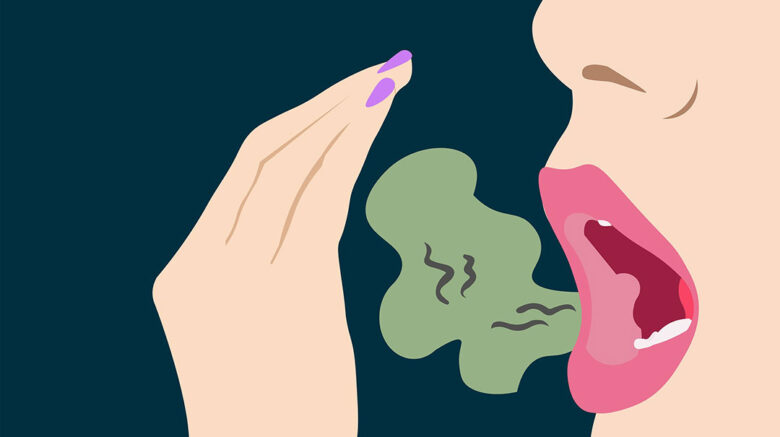What Women Need to Know
Chapter 7 pgs. 24-26
Q. I have a new boyfriend and a new problem – bad breath. Recently, much to my embarrassment, my boyfriend commented that my breath was bad, and suggested that I see a dentist. My dentist told me that my teeth are fine, but my breath still isn’t. I brush regularly and use mouthwash, what more can I do?
A. Bad Breath is such a common complaint that there are actually breath clinics springing up up around the country that specialize in treating this problem. In fact, it has been estimated that about 25 million Americans have a problem with bd breath at some point in their lives.
Bad breath is a result of the accumulation of anaerobic bacteria in the mouth, teeth, or gums that can emit unpleasant sulfur fumes. This particular breed of bacteria thrive in warm, dark places, and live on plaque deposits in teeth and food debris that may linger in the mouth or on the tongue. Gum disease or tooth decay is a leading cause of bad breath, and your boyfriend was correct to suggest that you see a dentist. Bad breath may also be a result of the monthly hormonal changes women go through. At the beginning of menstruation and during ovulation, women produce more protein in their saliva, which creates more sulfur fumes.
- Based on what you are telling me, however, I suspect your breath problem may be caused by a decrease in saliva production due to stress. Saliva helps keep your breath fresh by constantly irrigating or washing out the mouth. Chronic stress can hamper the production of saliva, thus promoting bad breath. Now that you are embarking on a new romance, you may be feeling more anxious than normal, and this may be affecting your saliva flow. There are several things you can do to increase your saliva production and keep your breath fresh.
- Replace lost moisture: You will need to compensate for the decrease in saliva production by keeping your mouth moist. Try taking frequent sips of water throughout the day. Simple measures, such as sucking on sugar-free mints, may also help stimulate saliva flow and freshen your mouth.
- Use mouthwash: When the people at Consumer Reports tested popular brands of mouthwash, they found that most did freshen breath and eliminate odor, but within ten minutes to an hour they stopped working. Some of the new mouthwashes on the market, however, contain a compound called chlorine dioxide, which, according to several studies, may be more effective in controlling bad breath then some of the older mouthwashes.
- Clean your tongue: Although the tongue appears to be a smooth, slippery surface, it is actually loaded with crevices that can be a magnet for bacteria. Some dentists recommend that when you brush your teeth, you should lightly brush your tongue. Interestingly, in India and Arab cultures, people use small shovel-like tongue scrapers several times a day to keep their breath fresh. Although tongue scarpers are sold in Middle Eastern and Indian markets, I recommend that you get one form a dentist who can show you how to use it.
If these simple measures don’t help your breath problem, your problem, your physician may prescribe a medication called pilocarpine (sold as Salogen) to help improve salivary flow. Pilocarpine works well for many people but should not be used by individuals with certain medical problems.
If your breath problem persists or gets worse, you should see your doctor. Bad breath is not just embarrassing; it could be a sign of a health problem. In addition to chronic stress, there are several other conditions that can be causing your bad breath, including a throat or sinus infection. If you have a stuffy nose or a post-nasal drip, check with your physician to see if you have an infection. Very often, a course of antibiotics can clear up both the infection and the bad breath. In addition some common physical ailments can cause a decrease in saliva flow, which will result in bad breath. For example, Sjogren’s syndrome, an autoimmune disease that primarily strikes women, can cause chronic dry mouth. Very often, people with Sjogren’s have other symptoms, including dry eye and joint pain. Certain medications, such as antidepressants and antihistamines, can also reduce salivary flow and cause bad breath. If it’s medication that is causing your problem, your physician may be able to prescribe another one.

